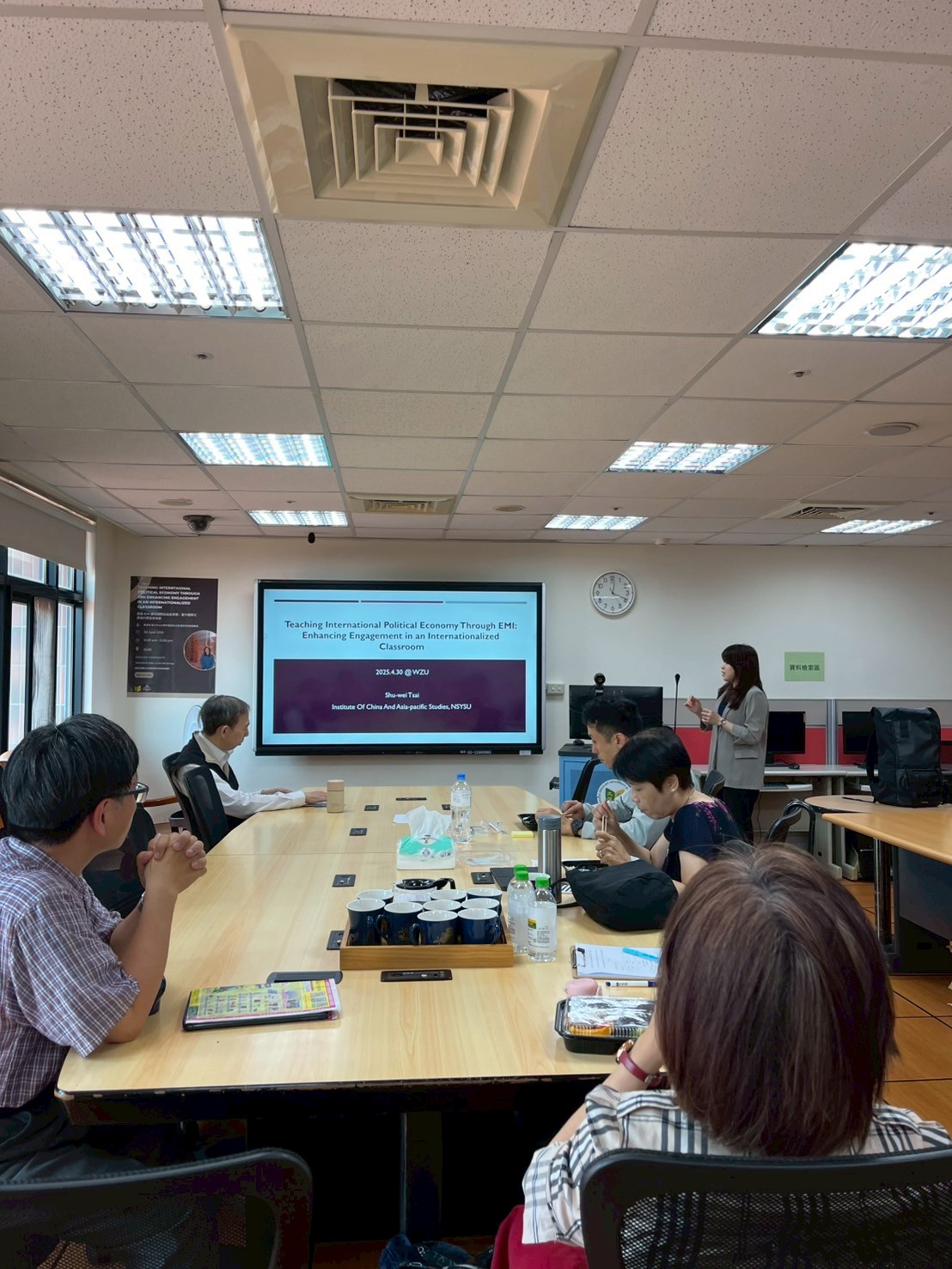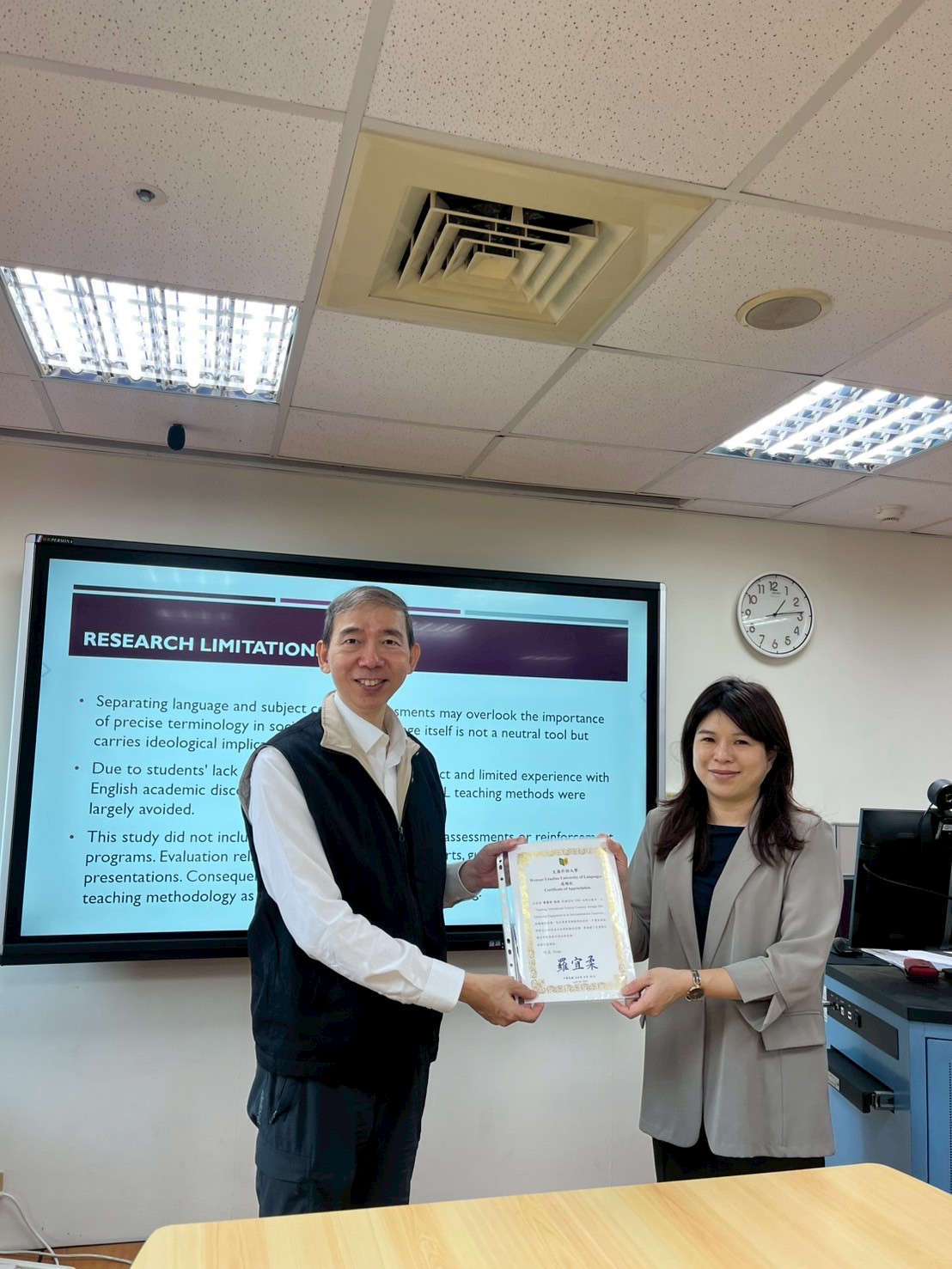【活動】教師社群-透過 EMI 講授國際政治經濟學:提升國際化課堂的學習參與度 Teaching International Political Economy through EMI: Enhancing Engagement in an Internationalized Classroom
發布日期 2025-05-05 10:51:00
Co-organized by the College of International Culture, Education, and Foreign Affairs and the Department of International Affairs, the faculty community "International Affairs, AI, and EMI Synergy" held a sharing session on April 30, 2025, in room Z406. The event featured Assistant Professor Dr. Shu-Wei Tsai from the Institute of China and Asia-Pacific Studies at National Sun Yat-sen University, who gave a talk titled:
“Teaching International Political Economy through EMI: Enhancing Engagement in an Internationalized Classroom”
(透過 EMI 講授國際政治經濟學:提升國際化課堂的學習參與度)
In her presentation, Dr. Tsai shared findings from her teaching-based research, which investigates a key question in the implementation of EMI education: Are students struggling primarily due to language barriers, or is the course design itself the core challenge? Her research sheds light on this crucial distinction, aiming to inform more effective EMI teaching practices.
Her course was structured around five core activities: reading academic literature, guided reading in class, instructor-led lectures, video presentations, and classroom discussions. Results from both midterm and final student surveys revealed both consistent patterns and significant changes in students’ perceptions of these activities.
- Consistency: In both the midterm and final surveys, instructor lectures were consistently ranked as the most helpful activity. This underscores the importance of well-structured, systematic lectures as a stable source of knowledge input in an EMI environment.
- Significant change: While group discussions were initially perceived as the least helpful activity at midterm, by the end of the semester, they had risen to the third most helpful—surpassing class presentations. This shift suggests that students gradually built confidence and became more engaged, showing improved critical thinking and communication skills.
Dr. Tsai also noted a marked reduction in students’ English anxiety as the semester progressed. Students transitioned from a passive, lecture-dependent mode of learning to a more active, discussion-based engagement. This transformation not only deepened their learning but also highlighted the importance of thoughtfully staged course design in enhancing EMI learning outcomes.
During the discussion, Professors Chen and Chiao from the Department of International Affairs, along with Professor Chang from the Department of English, also raised questions and shared reflections. The session fostered lively exchanges of ideas, with participants expressing a shared hope of further enhancing the effectiveness of EMI instruction in the classroom.
由國際文教與涉外事務學院和國際事務系共同合辦之教師社群「International Affairs, AI, and EMI Synergy」於2025年4月30日在 Z406 舉辦分享會,邀請國立中山大學中國與亞太區域研究所蔡書瑋助理教授,以「Teaching International Political Economy through EMI: Enhancing Engagement in an Internationalized Classroom透過 EMI 講授國際政治經濟學:提升國際化課堂的學習參與度」進行分享。
蔡老師在演講當中分享她的教學實踐研究成果。在雙語教育推行過程中,學生的學習困難究竟源於語言障礙,還是課程設計本身?她的研究特別釐清此一關鍵問題,期望為雙語教學的實務提供明確方向。
蔡老師的課程活動設計包含五項核心學習方式:閱讀文獻、課堂引導閱讀、教師講授、課程影片及課堂討論。從期中與期末的學生問卷調查結果顯示,學生對不同學習活動的感受在時間中出現明顯變化,也有一致不變之處。不變之處是在於期中與期末皆顯示「教師講課」為最有幫助的學習方式,顯示結構清晰、系統化的講授在雙語環境中扮演穩定的知識輸入角色。顯著變化:原本在期中被列為最不具幫助性的「小組討論」,在期末時大幅攀升至第三名,取代原本的「課堂簡報」。這顯示,學生在課程後半逐漸建立自信,能夠更積極參與對話,表現出更成熟的思辨與表達能力。
蔡老師指出,她的研究也發現,隨著課程進行,學生的英語焦慮明顯下降。從前期依賴講課的被動接受模式,過渡到後期透過討論展現主動參與,這一轉變不僅提升學習深度,也顯示課程設計的結構與階段性安排,對雙語學習成效具有實質影響。
分享會上,國事系陳玉珍老師、焦源鳴老師、英文系張登翰老師也都舉手發問或是分享,彼此交換意見,期盼共同提升在課堂上EMI的教學成效。(5/5)










